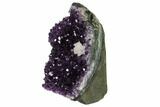This Specimen has been sold.
4.6" Amethyst Cut Base Crystal Cluster with Calcite - Uruguay
This is a gorgeous cluster of purple amethyst crystals with calcite from the famous mines near Artigas, Uruguay. The base of the cluster has been cut flat so that it stands up and displays nicely on a flat surface.
About Uruguay Amethyst
While Brazil is a much more prolific producer of amethyst, the amethyst mined near Artigas, Uruguay tends to be much darker with higher quality crystals. We import our material directly from the mines in Uruguay, allowing us to offer it at better retail prices than anyone else. We carry a large variety of geodes, amethyst clusters, and collector quality crystal formations.
Amethyst is a purple variety of quartz (SiO2) that owes its violet color to natural irradiation, iron impurities, and the presence of trace elements, resulting in complex crystal lattice substitutions. It is considered a semi-precious gemstone, and just two centuries ago was considered to have a value on par with diamonds, sapphires, and rubies. The largest and best known amethyst deposits occur in southern Brazil and Uruguay, but many localities around the world produce an amazing variety of amethyst crystals and formations.
While Brazil is a much more prolific producer of amethyst, the amethyst mined near Artigas, Uruguay tends to be much darker with higher quality crystals. We import our material directly from the mines in Uruguay, allowing us to offer it at better retail prices than anyone else. We carry a large variety of geodes, amethyst clusters, and collector quality crystal formations.
Amethyst is a purple variety of quartz (SiO2) that owes its violet color to natural irradiation, iron impurities, and the presence of trace elements, resulting in complex crystal lattice substitutions. It is considered a semi-precious gemstone, and just two centuries ago was considered to have a value on par with diamonds, sapphires, and rubies. The largest and best known amethyst deposits occur in southern Brazil and Uruguay, but many localities around the world produce an amazing variety of amethyst crystals and formations.
About Calcite Crystals
Calcite crystals are a form of calcium carbonate (CaCO₃) known for their diverse shapes, transparency, and vibrant range of colors. They typically form in rhombohedral, scalenohedral, or prismatic shapes, often with well-defined, sharp edges and glossy surfaces. Calcite crystals are often translucent or transparent, sometimes displaying a double refraction effect where objects viewed through the crystal appear doubled. They can appear in various colors—white, clear, yellow, pink, blue, green, and orange—depending on impurities or trace minerals.
A notable characteristic of calcite is its reaction with weak acids like vinegar, which causes it to effervesce, or fizz, as it releases carbon dioxide. This property makes calcite crystals a key tool in geological identification and studies. Calcite forms in many environments, from sedimentary rocks like limestone and marble to hydrothermal veins.
Calcite crystals are a form of calcium carbonate (CaCO₃) known for their diverse shapes, transparency, and vibrant range of colors. They typically form in rhombohedral, scalenohedral, or prismatic shapes, often with well-defined, sharp edges and glossy surfaces. Calcite crystals are often translucent or transparent, sometimes displaying a double refraction effect where objects viewed through the crystal appear doubled. They can appear in various colors—white, clear, yellow, pink, blue, green, and orange—depending on impurities or trace minerals.
A notable characteristic of calcite is its reaction with weak acids like vinegar, which causes it to effervesce, or fizz, as it releases carbon dioxide. This property makes calcite crystals a key tool in geological identification and studies. Calcite forms in many environments, from sedimentary rocks like limestone and marble to hydrothermal veins.
SPECIES
Quartz var. Amethyst & Calcite
LOCATION
Artigas, Uruguay
SIZE
4.6 x 3.9"
CATEGORY
SUB CATEGORY
ITEM
#151255
 Reviews
Reviews
















